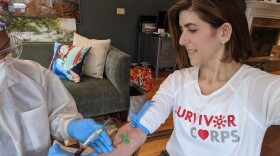-
Monoclonal antibody drugs are supposed to help people with mild to moderate COVID-19 avoid the hospital, but it can be a challenge to find out where the treatment is offered. NPR has heard from people across the country who have been frustrated by this. They include Shirley Wagoner, an 80-year-old who still hits the ski slopes and helps run the family plumbing business in Spokane Valley, Wash.
-
The medicine is one of the few to win regulatory approval as a treatment for the disease, but has fallen out of favor with the health authority.
-
Eli Lilly's monoclonal antibody will be available to people 65 or older or those with underlying health conditions. Supplies will be short, and allocating the medicine will be a challenge.
-
The federal government plans to distribute 300,000 doses of the drug at no cost, but that doesn't mean treatment will be free. Intravenous infusion charges can run more than $1,000.
-
One thing that has improved a lot over the course of the pandemic is treatment of seriously ill COVID-19 patients in intensive care units. Here's one man's success story.
-
As many firms and academic researchers vie for blood donations from survivors in hopes of isolating components for new treatments, one project is turning for help from 10,000 Orthodox Jewish women.
Play Live Radio
Next Up:
0:00
0:00
Available On Air Stations






